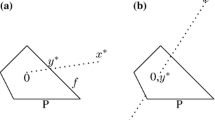Abstract
A critical step in a cutting plane algorithm is separation, i.e., establishing whether a given vector x violates an inequality belonging to a specific class. It is customary to express the time complexity of a separation algorithm in the number of variables n. Here, we argue that a separation algorithm may instead process the vector containing the positive components of x, denoted as supp(x), which offers a more compact representation, especially if x is sparse; we also propose to express the time complexity in terms of |supp(x)|. Although several well-known separation algorithms exploit the sparsity of x, we revisit this idea in order to take sparsity explicitly into account in the time-complexity of separation and also design faster algorithms. We apply this approach to two classes of facet-defining inequalities for the three-index assignment problem, and obtain separation algorithms whose time complexity is linear in |supp(x)| instead of n. We indicate that this can be generalized to the axial k-index assignment problem and we show empirically how the separation algorithms exploiting sparsity improve on existing ones by running them on the largest instances reported in the literature.




Similar content being viewed by others
References
Alvarez-Valdes, R., Parreo, F., Tamarit, J.: A branch-and-cut algorithm for the pallet loading problem. Comput. Oper. Res. 32, 3007–3029 (2005)
Appa, G., Magos, D., Mourtos, I.: On multi-index assignment polytopes. Linear Algebra Appl. 416, 224–241 (2006)
Applegate, D., Bixby, R., Chvátal, V., Cook, W.: The Traveling Salesman Problem: A Computational Study. Princeton University Press, Princeton (2006). (ISBN 978-0-691-12993-8)
Balas, E., Qi, L.: Linear-time separation algorithms for the three-index assignment polytope. Discrete Appl. Math. 43, 1–12 (1993)
Balas, E., Saltzman, M.: Facets of the three-index assignment polytope. Discrete Appl. Math. 23, 201–229 (1989)
Balas, E., Saltzman, M.: An algorithm for the three index assignment problem. Oper. Res. 39, 150–161 (1991)
Burkard, R., Rudolf, R., Woeginger, G.: Three-dimensional axial assignment problems with decomposable cost coefficients. Discrete Appl. Math. 65, 123–139 (1996)
Caprara, A., Salazar, J.: Separating lifted odd-hole inequalities to solve the index selection problem. Discrete Appl. Math. 92, 111–134 (1999)
Cheng, E., Cunningham, W.: Separation problems for the stable set polytope. In: Proceedings of The 4th Integer Programming and Combinatorial Optimization Conference Proceedings (1995)
Cheng, E., Cunningham, W.: Wheel inequalities for stable set polytopes. Math. Program. 77, 389–421 (1997)
Crama, Y., Spieksma, F.: Approximation algorithms for three-dimensional assignment problems with triangle inequalities. Eur. J. Oper. Res. 60, 273–279 (1992)
Van den Akker, J., van Hoesel, C., Savelsbergh, M.: A polyhedral approach to single machine scheduling problems. Math. Program. 85, 541–572 (1999)
Dokka, T.: Algorithms for multi-index assignment problems. PhD thesis, KU Leuven (2013)
Grundel, D., Pardalos, P.: Test problem generator for the multidimensional assignment problem. Comput. Optim. Appl. 30(2), 133–146 (2005)
Höfler, B., Fügenschuh, A.: Parametrized grasp heuristics for three-index assignment. EvoCOP Lect. Notes Comput. Sci. 3906, 61–72 (2006)
Kaparis, K., Letchford, A.: Separation algorithms for 0–1 knapsack polytopes. Math. Program. 124, 69–91 (2010)
Kececioglu, J., Lenhof, Hans-Peter, Mehlhorn, K., Mutzel, P., Reinert, K., Vingron, M.: A polyhedral approach to sequence alignment problems. Discrete Appl. Math. 104(1–3), 143–186 (2000)
Landete, M., Escudero, L., Marìn, A.: A branch-and-cut algorithm for the winner determination problem. Decis. Support Syst. 46, 649–659 (2009)
Magos, D., Mourtos, I.: Clique facets of the axial and planar assignment polytopes. Discrete Optim. 6, 394–413 (2009)
Nemhauser, G.L., Sigismondi, G.: A strong cutting plane/branch-and-bound algorithm for node packing. J. Oper. Res. Soc. 5, 443–457 (1992)
Qi, L., Sun, D.: Polyhedral methods for solving three index assignment problems. In: Pardalos, P.M., Pitsoulis, L. S., (eds.) Nonlinear Assignment Problems: Algorithms and Applications, pp. 91–107. Springer, US (2000)
Rebennack, S., Oswald, M., Oliver Theis, D., Seitz, H., Reinelt, G., Pardalos, P.: A branch and cut solver for the maximum stable set problem. J. Comb. Optim. 21(4), 434–457 (2011)
Schrijver, A.: Combinatorial Optimization, Polyhedra and Efficiency. Springer, Berlin (2003)
Spieksma, F.: Multi-index assignment problems: complexity, approximation, applications. In: Pardalos, P.M., Pitsoulis, L. (eds.) Nonlinear Assignment Problems: Algorithms and Applications, pp. 1–12. Kluwer Academic Publisher, Nowell (2000)
Acknowledgments
We are thankful to Armin Fügenschuh for providing the routines to generate instances used in [15], and to Yves Crama for stimulating discussions on this subject.
Author information
Authors and Affiliations
Corresponding author
Additional information
This paper is an improved version of an extended abstract that appeared as “Fast separation algorithms for three index assignment problems” in the proceedings of ISCO 2012, LNCS 7422, pp. 189–200, 2012.
This research has been co-financed by the European Union (European Social Fund ESF) and Greek national funds through the Operational Program “Education and Lifelong Learning” of the National Strategic Reference Framework (NSRF)—Research Funding Program: Thales: Investing in knowledge society through the European Social Fund (MIS: 380232), and this research has been supported by the Interuniversity Attraction Poles Programme initiated by the Belgian Science Policy.
Rights and permissions
About this article
Cite this article
Dokka, T., Mourtos, I. & Spieksma, F.C.R. Fast separation for the three-index assignment problem. Math. Prog. Comp. 9, 39–59 (2017). https://doi.org/10.1007/s12532-016-0106-x
Received:
Accepted:
Published:
Issue Date:
DOI: https://doi.org/10.1007/s12532-016-0106-x




